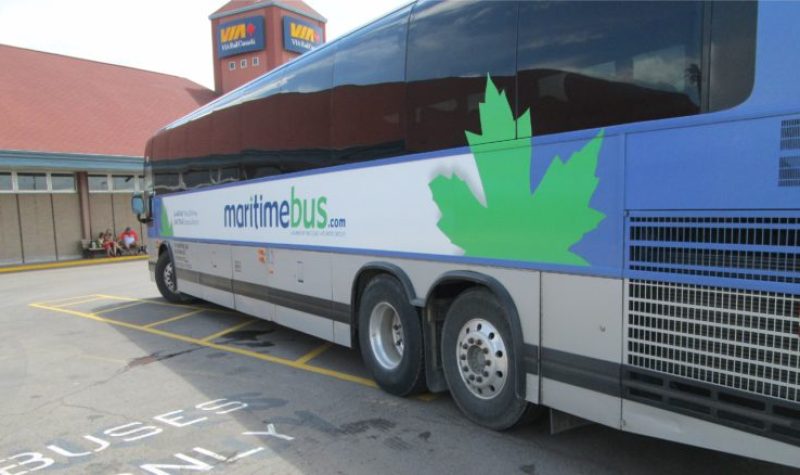A national advocacy group for public transport wants to bring intercity buses back to life in Canada, and they are reaching out to passengers and travellers across the country to help gather their views and experiences.
CHMA spoke with Transport Action Canada president Terry Johnson to find out more:
“About 40% of the population does not drive,” says Johnson. “That includes seniors, all our kids, a lot of people who have often quite minor disabilities… It prevents people from fully participating in society, or means they’re reliant on somebody else.”
Transport Action Canada is quite likely the country’s longest-lived advocacy group for public transportation. This year, they have taken on a research project aimed at policy options that could return intercity bus connectivity, functionality, and just plain old service to towns and communities across Canada.
Part of the research is the Canada-wide Motorcoach Travel Survey: a five minute questionnaire for anyone with thoughts, experiences and aspirations to share on the future of Canada’s intercity bus network.
“There’s an awful lot of social and economic opportunity that just goes down the drain when you have a totally car dependent society,” says Johnson. ”Not to mention all the pollution impacts, and all the costs. The physics of individual cars are really very bad. And they don’t even get much better when it’s an electric car.”
Transport Action favours public transport options because, “if you have a lot of people sharing a vehicle, not only can you massively improve the economics, you can include everybody,” says Johnson. “That’s the other angle we’re looking at here, is making sure every Canadian has the ability to travel in our country.”
The survey will be live for another week or so, says Johnson, and asks questions like, “what are your pain points? Where did you used to travel that you can’t travel now? Or where would you like to be able to travel? We want to try and get a good overview of what it is people really are experiencing.”
The goal is to find possible policy solutions, says Johnson, “to make this industry functional again. Because at the moment it’s a very dysfunctional industry.”
If you accept the social, economic, and environmental case for functional intercity bus service in Canada, the next question is how to achieve it. There’s a mash up of different services available now in the country, some private, some public, some connected to each other, some not.
“If there was a case for a four-lane highway, then presumably, there’s also a case for a bus, so the people who do not have a car or do not drive can also use what is clearly a major route between two places,” says Johnson. “What’s difficult, is working out how to do this in a way that actually works very well for the industry and works very well for the taxpayer and the passenger at the same time.”
Johnson acknowledges calls for nationalization of the intercity bus business, but says Transport Action’s recommendations will likely take a “more nuanced approach.”
Bus service in the Maritimes, believe it or not, is much better than many other parts of the country right now because of Maritime Bus, a private operator that managed to survive the pandemic, with some government support.
“Maritime Bus are exactly the kind of Canadian-owned business success story that we really ought to be celebrating a bit more in this country,” says Johnson. “They had a hard time getting any support from the federal government to keep operating through the pandemic, even though they were incredibly innovative in doing things like putting in plexiglass screens between seats, because they knew how essential their service was to people in the Maritimes.”
But Maritime Bus services did suffer during the pandemic, and the service cannot connect beyond the Maritimes due to a lack of cooperation from neighbouring providers, like Orleans Express, which runs a service between the Gaspe and Montreal.
“There’s a lot of opportunity to make a difference and create value that’s lost when you don’t have the connectivity,” says Johnson. “If you put a twig in water, you might be lucky and have it grow for a little bit. But if you leave the twig attached to the tree, it would do alright.”
Johnson says the gold standard in Canadian bus service used to exist in Saskatchewan, up until 2017, when an austerity budget killed the Saskatchewan Transportation Company and sold off its assets. The STC served hundreds of small towns and communities in Saskatchewan, with daily services. But the service was being subsidized by about $10 million per year, and so Brad Wall’s government scrapped it.
Researchers at the University of Saskatchewan are now studying the impacts of killing the STC, particularly on the province’s beleaguered medical system.
“There’s an increasing body of research that points to loss of core mobility services as being something that actually ends up costing us an absolute fortune,” says Johnson. “Because people’s medical problems are not been treated early enough, etc. And then the cost of the healthcare system becomes higher.”
“All the pieces that mobility touches,” says Johnson, “your health, education, access to employment, social connections… that was worth so much more than $10 million a year.”
The Canada-wide Motorcoach Travel Survey will wrap up at the end of this summer, and the policy report is expected in the fall.


